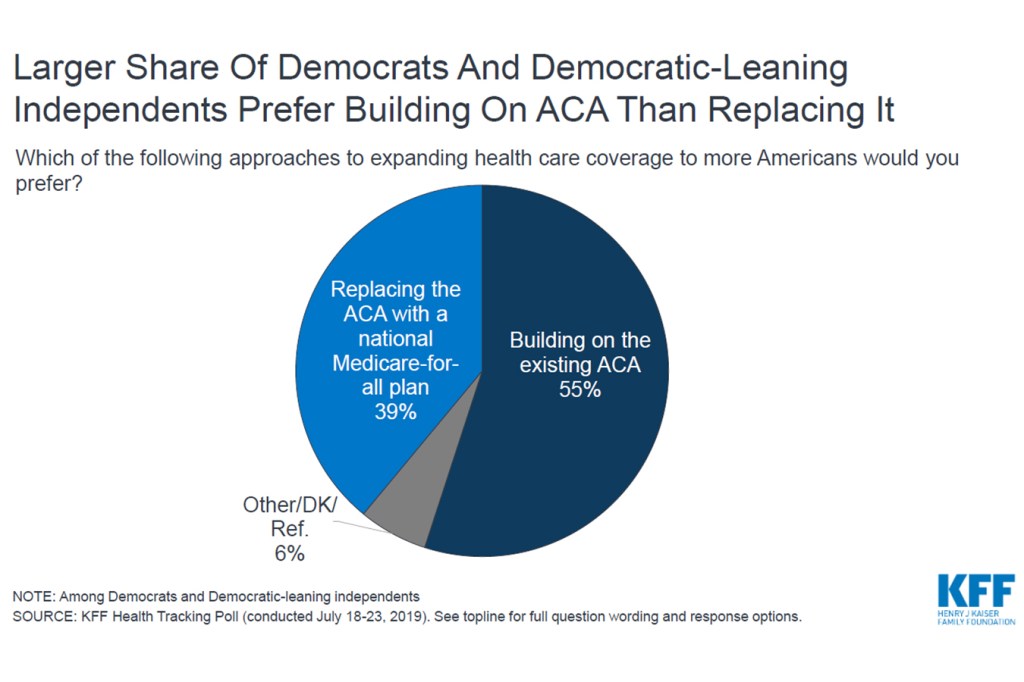Bernie Sanders and Elizabeth Warren and their respective rabid supporters are adamant about nothing less than Medicare for all in contrast to others, including Pete Buttigieg who want a more moderate, blended approach to expanding health care coverage. Personally, I view Medicare for all as a laudatory goal, but in order to get to full coverage implemented, candidates need to get elected. Results from the 2018 mid-term elections suggest that Medicare for all is a vote loser and could be kryptonite to getting elected. Thus, I support a more moderate approach such as Buttigieg's which would not sweep away employer based plans and potentially alienate moderate voters and Republicans - few as they may be - who are sickened by Donald Trump. A piece at Larry Sabato's Crystal Ball looks at the cautionary message from what happened to Democrats running on Medicare for all in the 2018 midterms. Here are excerpts:
“Medicare for All” has emerged as a key issue in the 2020 Democratic presidential nomination campaign. Two of the leading candidates, Sens. Bernie Sanders (I-VT) and Elizabeth Warren (D-MA), have made Medicare for All a central issue in their campaigns. Warren’s and Sanders’ proposals would abolish private health insurance in the U.S. within a few years and move all Americans into a government health plan based on the current Medicare program but with no copayments or deductibles.Several Democratic candidates, including former Vice President Joe Biden, who has led in most national polls, have been highly critical of this idea. These candidates, along with a number of health policy experts and pundits, have attacked Sanders’ and Warren’s Medicare for All proposal as prohibitively expensive and politically unrealistic. They have also argued that embracing Medicare for All would alienate many independents and moderate Democrats and risk costing Democrats the electoral votes of several key swing states.
But 2020 is not the first election in which Medicare for All was an important campaign issue. It was also debated extensively during the 2018 midterm elections. By examining the impact of Medicare for All on the results of the 2018 U.S. House elections, we may gain some insights into how this issue could affect the 2020 presidential election.
Democratic candidates supporting Medicare for All did substantially worse than those who did not — winning only 45% of their races compared with 72% for the non-supporters. Their average vote margin of 0.5 percentage points was also somewhat worse than the average vote margin of 3.5 points for the non-supporters. This was true despite the fact that in terms of 2016 presidential vote margin, the districts of supporters were somewhat more Democratic (average Clinton margin of -0.2 points) than the districts of non-supporters (average Clinton margin of -2.7 points).
[A]fter controlling for all of the other variables affecting the outcomes of these contests, Democratic candidates who endorsed Medicare for All did significantly worse than those who did not. The estimated coefficient of -4.6 indicates that support for Medicare for All cost Democratic candidates in these competitive districts almost five points of vote margin — a substantial effect in a close election.
An analysis of the impact of Medicare for All on the 2018 House elections indicates that Democratic challengers and open seat candidates in competitive districts who endorsed a version of Medicare for All similar to that proposed by Bernie Sanders and Elizabeth Warren did significantly worse than those who did not. This negative effect, close to five points of margin after controlling for a variety of other factors, was clearly large enough to affect the outcomes of some House contests.
Yes, Sanders and Warren supporters will be livid with this post, but elections are about WINNING, not ideological purity.It is possible that the estimated effect of Medicare for All was a byproduct of other differences between supporters and non-supporters. For example, supporters might have taken more liberal positions on a variety of other issues as well as Medicare for All. Even if that is the case, however, these findings are not encouraging to supporters of Medicare for All. They indicate that candidates in competitive races who take positions to the left of the median voter could get punished at the polls. Democratic presidential candidates would do well to take heed of these results, particularly as the eventual nominee determines what he or she wishes to emphasize in the general election.

No comments:
Post a Comment